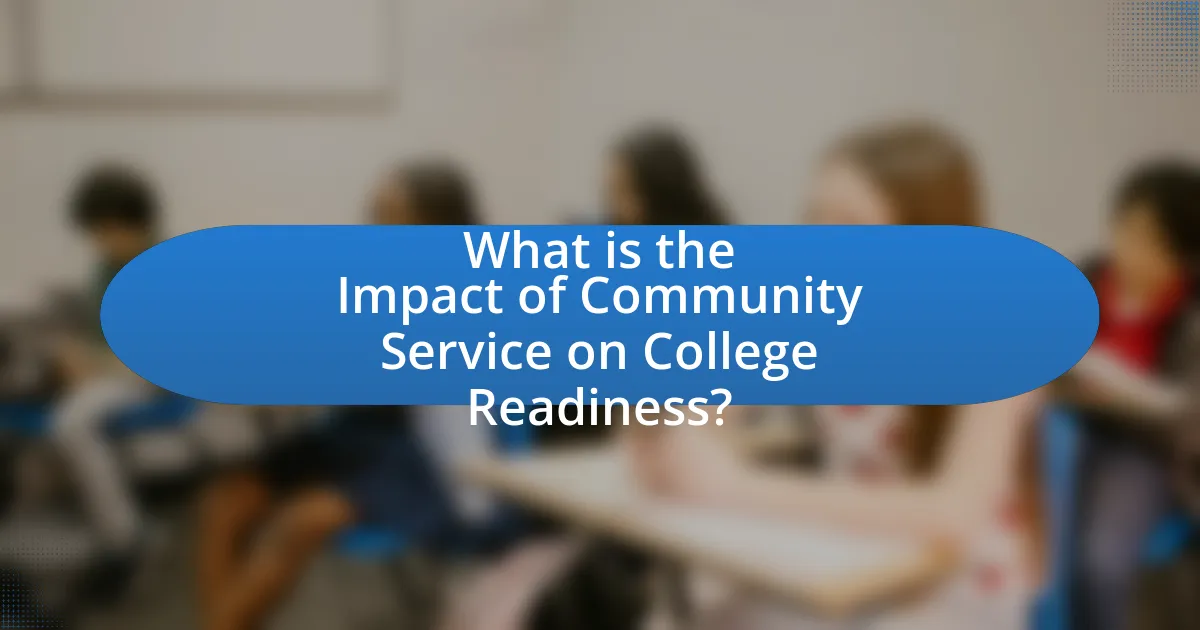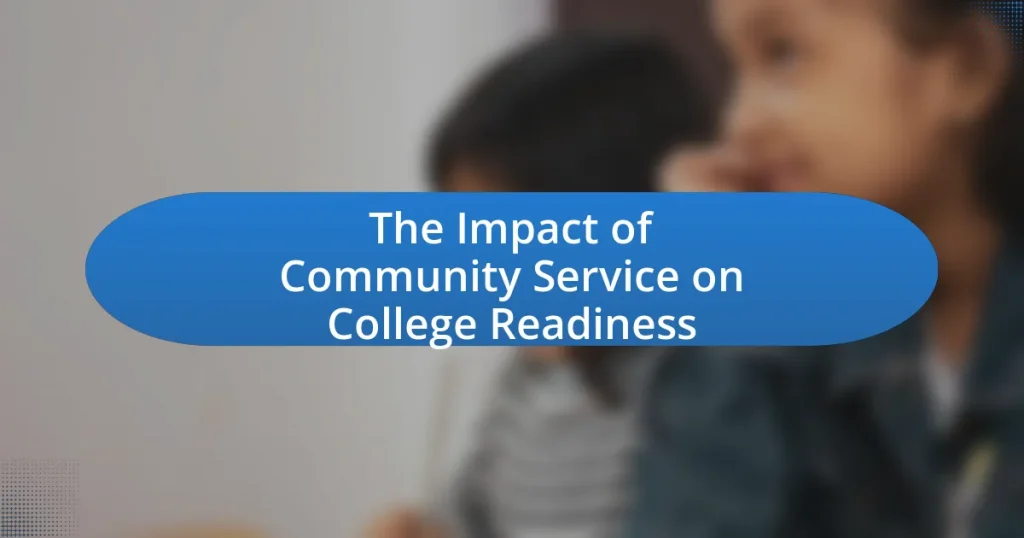The article examines the impact of community service on college readiness, highlighting how participation enhances students’ social skills, academic performance, and civic engagement. It discusses the development of essential competencies such as teamwork, communication, and problem-solving through community service, which are critical for success in college. Research findings indicate that students involved in community service often achieve higher GPAs, exhibit increased motivation, and demonstrate improved college enrollment and graduation rates. Additionally, the article outlines specific skills enhanced by community service, the long-term effects on educational trajectories, and strategies for students to effectively balance community service with academic responsibilities.

What is the Impact of Community Service on College Readiness?
Community service positively impacts college readiness by enhancing students’ social skills, academic performance, and civic engagement. Engaging in community service helps students develop critical soft skills such as teamwork, communication, and problem-solving, which are essential for success in college environments. Research indicates that students who participate in community service often achieve higher GPAs and are more likely to pursue higher education. For instance, a study published in the Journal of College Student Development found that students involved in service-learning programs reported increased motivation and academic engagement, leading to improved college readiness.
How does community service contribute to the development of college readiness skills?
Community service significantly contributes to the development of college readiness skills by fostering essential competencies such as time management, teamwork, and communication. Engaging in community service requires individuals to balance their commitments, enhancing their ability to manage time effectively, which is crucial for academic success in college. Additionally, community service often involves collaboration with diverse groups, promoting teamwork skills that are vital in both academic and professional settings. Furthermore, the necessity to communicate effectively with peers and community members during service activities strengthens verbal and written communication skills, which are fundamental for college coursework. Research indicates that students who participate in community service demonstrate higher levels of engagement and preparedness for college, as evidenced by studies showing improved academic performance and increased likelihood of college enrollment among service participants.
What specific skills are enhanced through community service participation?
Community service participation enhances specific skills such as leadership, teamwork, communication, problem-solving, and empathy. Engaging in community service requires individuals to take initiative and lead projects, thereby developing leadership abilities. Working alongside diverse groups fosters teamwork skills, as participants must collaborate effectively to achieve common goals. Communication skills are honed through interactions with community members and fellow volunteers, while problem-solving skills are enhanced by addressing real-world challenges faced by the community. Additionally, community service cultivates empathy, as participants gain a deeper understanding of the needs and experiences of others. Research indicates that students involved in community service report improved interpersonal skills and a greater sense of social responsibility, further validating the positive impact of such participation on skill enhancement.
How do these skills translate to academic success in college?
Skills developed through community service translate to academic success in college by enhancing critical thinking, time management, and teamwork abilities. Engaging in community service fosters problem-solving skills as individuals encounter real-world challenges, which prepares them for complex academic tasks. Additionally, managing service commitments alongside academic responsibilities cultivates effective time management, a crucial skill for balancing coursework and deadlines. Research indicates that students involved in community service demonstrate higher levels of engagement and motivation, leading to improved academic performance. For instance, a study published in the Journal of Higher Education found that students who participated in service-learning programs had a 10% higher GPA compared to their peers who did not engage in such activities.
Why is community service considered an important aspect of college preparation?
Community service is considered an important aspect of college preparation because it fosters essential skills and experiences that enhance a student’s readiness for higher education. Engaging in community service develops critical thinking, teamwork, and leadership abilities, which are vital for academic success. Research from the Corporation for National and Community Service indicates that students who participate in service activities are more likely to graduate from college, with a 20% higher graduation rate compared to those who do not engage in such activities. Additionally, community service provides opportunities for networking and building relationships with diverse groups, further enriching the college experience.
What role does community service play in building a college-ready mindset?
Community service plays a crucial role in building a college-ready mindset by fostering essential skills such as time management, teamwork, and leadership. Engaging in community service activities requires students to balance their commitments, enhancing their ability to manage academic responsibilities alongside extracurricular activities. Research indicates that students who participate in community service develop stronger interpersonal skills, which are vital for collaborative learning environments in college. Additionally, a study by the Corporation for National and Community Service found that students involved in service-learning programs are more likely to have higher GPAs and graduation rates, demonstrating a direct correlation between community service and academic success.
How does community service influence students’ social and emotional development?
Community service significantly enhances students’ social and emotional development by fostering empathy, improving interpersonal skills, and promoting a sense of belonging. Engaging in community service allows students to interact with diverse groups, which cultivates understanding and compassion towards others. Research indicates that students who participate in service-learning programs report higher levels of self-esteem and emotional well-being, as they feel more connected to their communities. A study published in the Journal of Adolescence found that students involved in community service exhibited greater social competence and emotional regulation, which are critical skills for college readiness and future success.
What are the long-term effects of community service on students’ educational trajectories?
Community service positively influences students’ educational trajectories by enhancing their academic performance, increasing college enrollment rates, and fostering lifelong civic engagement. Research indicates that students who participate in community service often develop critical skills such as leadership, teamwork, and problem-solving, which contribute to improved academic outcomes. A study by the Corporation for National and Community Service found that students engaged in service-learning had higher GPAs and were more likely to pursue higher education compared to their peers who did not participate in such activities. Additionally, community service experiences can lead to stronger social networks and increased motivation, further supporting students’ educational goals and aspirations.
How does community service impact college admissions and scholarship opportunities?
Community service positively impacts college admissions and scholarship opportunities by demonstrating a student’s commitment to civic engagement and leadership. Colleges and scholarship organizations often seek candidates who show initiative and a willingness to contribute to their communities, as these qualities indicate potential for future involvement on campus. According to a 2018 survey by the National Association for College Admission Counseling, 70% of colleges consider community service as a significant factor in their admissions decisions. Additionally, many scholarship programs specifically award funds based on community service involvement, recognizing it as a key indicator of character and dedication.
What evidence exists to support the correlation between community service and college success?
Research indicates a positive correlation between community service and college success, as students engaged in community service often demonstrate higher academic performance and increased retention rates. A study by Astin and Sax (1998) found that students who participated in community service during college had a 10% higher graduation rate compared to their peers who did not engage in such activities. Additionally, a report from the Corporation for National and Community Service (2010) highlighted that students involved in service-learning programs had improved critical thinking skills and greater civic engagement, which are essential for academic success. These findings collectively support the assertion that community service contributes significantly to college readiness and overall success.
How can students effectively engage in community service to enhance college readiness?
Students can effectively engage in community service to enhance college readiness by participating in structured programs that develop skills relevant to academic and professional success. Engaging in community service allows students to cultivate essential skills such as teamwork, leadership, and communication, which are critical for college environments. Research indicates that students who participate in community service report higher levels of academic engagement and improved time management skills, both of which are vital for college success. For instance, a study published in the Journal of College Student Development found that students involved in community service had a 20% higher retention rate in college compared to those who did not participate. This demonstrates that community service not only fosters personal growth but also prepares students for the demands of higher education.
What types of community service activities are most beneficial for college preparation?
Volunteer work in tutoring, mentoring, and leadership roles are the most beneficial types of community service activities for college preparation. Engaging in tutoring helps develop communication and teaching skills, which are essential in college settings. Mentoring provides opportunities to build relationships and demonstrate commitment to personal growth, while leadership roles enhance organizational and teamwork abilities, both of which are highly valued by colleges. Research indicates that students who participate in these activities often exhibit higher levels of academic performance and college readiness, as they develop critical soft skills and a sense of responsibility.
How can students choose community service opportunities that align with their career goals?
Students can choose community service opportunities that align with their career goals by identifying their interests and skills, researching relevant organizations, and seeking experiences that provide practical applications of their desired career paths. For instance, a student interested in healthcare may volunteer at a hospital or clinic, gaining hands-on experience and networking opportunities within the medical field. Research indicates that students who engage in community service related to their career aspirations are more likely to develop relevant skills and enhance their employability, as evidenced by a study from the Corporation for National and Community Service, which found that 63% of employers value volunteer experience as much as paid work experience.
What strategies can students use to balance community service with academic responsibilities?
Students can balance community service with academic responsibilities by implementing effective time management strategies. Prioritizing tasks through a planner or digital calendar allows students to allocate specific time slots for both academic work and community service activities. Research indicates that students who engage in structured scheduling report higher academic performance and satisfaction in both areas. Additionally, setting clear goals for both community service and academic achievements helps maintain focus and motivation. A study published in the Journal of College Student Development found that students who actively set and track their goals are more likely to succeed in managing multiple commitments. By integrating community service into their academic curriculum, such as through service-learning courses, students can fulfill both responsibilities simultaneously, enhancing their college readiness and civic engagement.
What best practices should students follow to maximize the impact of community service on their college readiness?
Students should engage in community service that aligns with their academic and career interests to maximize its impact on college readiness. By selecting service opportunities related to their intended field of study, students can develop relevant skills and gain practical experience that enhances their resumes and college applications. Research indicates that students who participate in service-learning programs demonstrate improved academic performance and higher rates of college enrollment, as noted in a study by the Corporation for National and Community Service, which found that service-learning can lead to increased engagement and motivation in school. Additionally, students should reflect on their experiences through journaling or discussions, as this practice fosters critical thinking and personal growth, further preparing them for the challenges of higher education.


